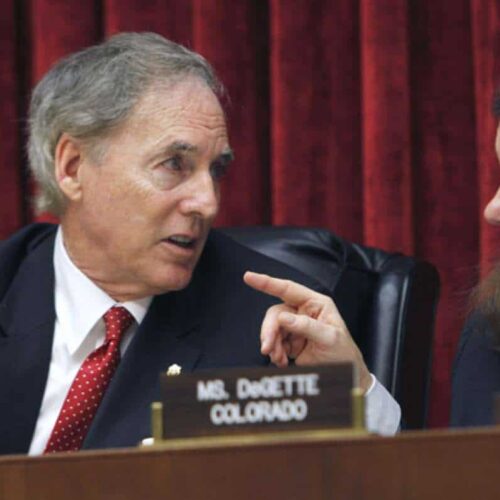Introduction
As it scrambled to save the flagship company of the Obama administration’s green energy program, the Energy Department ignored repeated warnings from top Treasury Department officials that it was not following guidelines in refinancing Solyndra’s half-billion dollar federal loan, a Congressional hearing Friday revealed.
When the DOE refinanced the government’s $535 million loan to the California solar panel manufacturer in February, it agreed to let investors, including a major Obama fundraiser, stand in line before the public to recoup the first $75 million of their investment should the company fail. Solyndra declared bankruptcy six weeks ago.
During a House Energy and Commerce hearing on the refinancing of the loan Friday, Rep. Cliff Stearns, R.-Fla., chairman of the Committee’s Oversight and Investigations Subcommittee, asked Treasury Department CFO Gary Burner if he had ever seen another case where taxpayer money was subordinated to that of investors.
“No sir, I have not,” said Burner, who has been with the department for 28 years, becoming chief financial officer five years ago.
Internal Treasury Department documents released by the committee also show that officials warned DOE and the White House about the refinancing.
The Office of Management and Budget also raised questions, emails show. In December 2010, as DOE moved to restructure the loan, an OMB official wrote: “There are some questions at the staff level about how DOE is going about the restructuring for Solyndra. At least one involves the legal question of what [the statute] means for their plan to make some of the debt “junior” to the new debt. … I think they have stretched this definition beyond its limits.”
The refinancing is one piece in a long string of favorable terms the government granted to Solyndra, a start-up solar panel firm that secured the Energy Department’s first loan guarantee in March 2009 in what was touted as a signature project for the green energy movement. DOE pressed ahead with that financing — and everyone from Energy Secretary Steven Chu to President Obama made personal trips to the California plant — despite repeated red flags the loan was a risky bet.
Now the company has collapsed and Congress, the FBI and the inspectors general of the Energy and Treasury departments are all investigating the loan. The head of the Energy Department’s loan program and Solyndra’s CEO have both resigned in recent weeks.
Some Energy and Commerce Committee members, including Stearns, contend the DOE violated the Energy Policy Act of 2005 during the refinancing by putting investors in line before taxpayers to recoup any recovered funds. Those investors — including a major fundraiser for President Obama, George Kaiser — provided $75 million to help prop up Solyndra in February at the time of the government’s refinancing.
“This seems to me a clear violation of the Energy Policy Act of 2005, which says DOE shall consult with OMB and the Secretary of the Treasury before granting any deviation in the loan,” said Fred Upton, R-Mich., chair of the committee. “Putting the taxpayers at the back of the line behind private investors in the event of liquidation is not only a deviation, it is apparently unprecedented.”
Questions From Treasury About Loan
Records show Treasury raised questions from the start about DOE’s plan. On February 10, 2011, CFO Burner sent an email to DOE officials after learning about the refinancing. “We understand that these adjustments may include subordination of Solyndra’s $535 million reimbursement obligation to DOE and possibly the forgiveness of interest. Unless DOE has other authorities, these adjustments may require approval of the Department of Justice,” he wrote.
Treasury’s questions persisted. In one pointed memo shortly before Solyndra declared bankruptcy this summer, a top Treasury official wrote to the White House to make clear that the decision to restructure the deal did not have Treasury or Justice Department approval — despite early suggestions that approval from both agencies may be required.
“To our knowledge, that has never happened,” wrote Mary J. Miller, Treasury’s assistant secretary for financial markets. “While I expect that DOE has a view about why loan subordination can occur without DOJ approval or Treasury consultation, I wanted to correct any impression that we have acquiesced in the steps to date.”
In another email in August, a Treasury lawyer weighed in: “But I will bet a quarter that the DOE lawyers have some kind of theory on how whatever restructuring they have done and whatever they are considering doing does not violate these requirements. Can’t wait to hear it.” On Friday, Burner and a second witness, Gary Grippo, Treasury’s Deputy Assistant Secretary for Fiscal Operations and Policy, said the department’s role was to advise DOE and flag concerns. But they said Treasury could not legally reject the refinancing.
The Department of Energy said its refinancing was legal, and DOE has crafted a six-page memo outlining its justification. Officials say they conducted a “careful analysis” before moving and decided they had “broad authority in a distressed situation to take action that will protect the taxpayer.” In the end, the Energy Department said, it decided to back a financially strapped company as an effort to save the project.
“As is typical in cases where distressed companies seek new debt financing, the new financing would have priority, in the event of liquidation, over the company’s existing debt — including the DOE loan guarantee (the investors’ almost $1 billion of original equity investment was, and remains, subordinated to the debt owed to the government),” the department said in the memo.
“DOE faced a choice: whether to (1) refuse to allow the restructuring, thereby ensuring that Solyndra would close its doors immediately, and that the U.S. taxpayer would recover only a modest amount of the loan; or (2) allow the company to accept the emergency financing, thereby giving it and its almost 1,000 workers a fighting chance at success, and the government a higher expected recovery on its loan,” the department wrote.
Questions About Political Influence
In March, The Center for Public Integrity’s iWatch News, in partnership with ABC News, began exposing questions about the role political influence may have played in Department of Energy loan projects, including Solyndra’s selection as the Obama administration’s first loan guarantee recipient. DOE said its recipients won awards on merit, and that it backs innovative and potentially risky projects as environmental game changers.
The House Energy and Commerce Committee has sought information from Solyndra’s prime investors, including Oklahoma oil billionaire Kaiser, a “bundler” of campaign contributions to the president in 2008.
Damien LaVera, an Energy Department spokesman, said politics never entered the decision to grant the loan or restructure it earlier this year. LaVera said the department decided it was worth trying to salvage the government’s initial investment. “[P]olitical or optical considerations took a backseat to putting the company and its workers in a better position to succeed and repay the loan,” he said.
Last week, Jonathan Silver, executive director of DOE’s Loans Programs Office, resigned. Silver was not on board when the Solyndra loan was issued, but he was when it was refinanced earlier this year. Before his resignation, Silver staunchly defended the loan refinancing and had predicted Solyndra would succeed.
Solyndra CEO Brian Harrison also resigned last week. In papers filed with a bankruptcy court Wednesday, Solyndra said Harrison left his post on Friday, Oct. 7, “as contemplated even before these cases were commenced.”
Solyndra filed the papers in a Delaware court in response to a motion by the Department of Justice to appoint a trustee to oversee the company’s bankruptcy case. The Justice Department filed its motion after Harrison and Solyndra’s CFO, W.G. Stover, invoked the Fifth Amendment and refused to answer questions from the House Energy and Commerce Committee during a Sept. 23 hearing. The company also refused to answer key questions in the bankruptcy proceeding.
A Solyndra attorney told U.S. officials the reason he would not identify the company’s customers or talk about its contracts was because “the topic would likely be the subject of investigation and possibly litigation,” according to a court filing.
Read more in Money and Democracy
Money and Democracy
One House seat in Kentucky embodies how outside groups dominate politics — with money
Endangered incumbent calls outside spending “an outrage to democracy”
Money and Democracy
FACT CHECK: Perry misses the facts on fracking
GOP presidential hopeful’s statement on EPA as a jobs-killer holds no water


Join the conversation
Show Comments